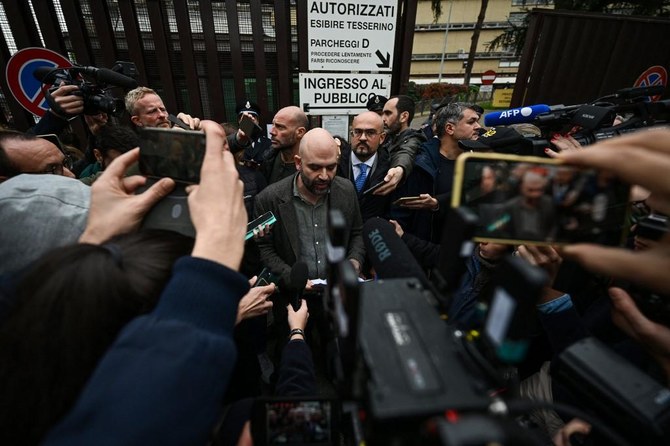ROME: A trial pitting Italy’s far-right Prime Minister Giorgia Meloni against investigative journalist Roberto Saviano opened Tuesday, with the anti-mafia author accused of defamation for an outburst over her stance on migrants.
Meloni’s Brothers of Italy party was in opposition at the time, but took office last month after triumphing at the polls on a nationalist campaign that promised to stop migrants crossing the Mediterranean from North Africa.
Saviano, best known for his international mafia bestseller “Gomorrah,” faces up to three years in prison, if convicted.
In a short speech outside the Rome court, he said Meloni’s attack on those who save lives at sea was “inhuman.”
The case dates back to December 2020 when he was asked on a political TV chat show for a comment on the death of a six-month-old baby from Guinea in a shipwreck.
The baby, Joseph, had been one of 111 migrants rescued by the Open Arms charity ship, but died before he could receive medical attention.
In footage shot by rescuers and shown to Saviano on the chat show, the baby’s mother — who has just been pulled from the sea without Joseph — can be heard weeping “Where’s my baby? Help, I lose my baby!“
A visibly emotional Saviano then blasted Meloni and Matteo Salvini — the leader of the anti-immigrant League party, which is now part of her coalition government — who have both long used anti-migrant rhetoric.
“I just want to say to Meloni, and Salvini, you bastards! How could you?” Saviano said on the show.
Meloni said in 2019 that charity vessels which rescue migrants “should be sunk,” while Salvini, as interior minister that same year, blocked such vessels from docking.
Salvini joined the criminal proceedings on Tuesday as a civil party seeking damages.
In a speech read out to journalists outside the court after the hearing, Saviano said that he had used the term bastards to highlight the damage done by Meloni and Salvini’s “lies” about charity rescuers.
“How could you be so thoughtless as to isolate, to smear, to transform sea ambulances into pirate ships?” he said.
“Letting people drown isn’t a political opinion. It’s not a political opinion to discredit rescue ambulances, it is infamy, and above all it’s inhuman.”
The judge set the next hearing for December 12.
PEN International, an organization that defends free speech, sent an open letter to Meloni last week urging her to drop the case.
Ahead of the trial Saviano, 43, told AFP it was an “unequal confrontation, decidedly grotesque,” while press freedom groups warned it sent a “chilling message” to journalists.
The author, who has been under police protection since publishing “Gomorrah” due to threats from the Naples “Camorra” mafia, said the tactic was to “intimidate one in order to intimidate 100.”
Watchdogs say such trials are symbolic of a culture in Italy in which public figures — often politicians — intimidate reporters with repeated lawsuits.
Meloni’s lawyer Luca Libra said Tuesday there was no intention of “intimidating” anyone.
His client was “just a woman who was insulted... on television in front of millions of people,” he said.
Meloni would consider whether or not to withdraw the complaint, Libra added.
Italy ranked 58th in the 2022 world press freedom index published by Reporters Without Borders, the lowest level in western Europe.
Tuesday’s trial is not the only one Saviano faces for defamation. He was sued in 2018 by Salvini after calling him “Il Ministro della Malavita,” or minister of the criminal underworld.
That trial is set to open in February.
















